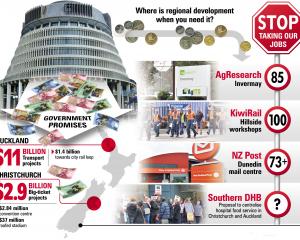Tertiary Education Minister Steven Joyce, in his first speech in the role, told a business audience in Wellington this morning that he had three short-term goals - to tackle course completion rates; have qualifications that were meaningful and ensure student support money was not wasted.
Mr Joyce said that the sector's funding needed to be better used because there would be no more coming in the budget.
Between 5 and 10 percent of government funding for tertiary providers would be linked to student performance and dropout rates.
"Educational performance will be measured using indicators like successful course completion, qualification completion and student progression."
The Education Ministry, Tertiary Education Commission (TEC) and Mr Joyce were working on how to apply the new requirement.
The proportion of funding affected would be kept low at the start but could increase over time. He told journalists 90 to 95 percent of funding would still be based on enrolments.
Mr Joyce said he did not have a general concern about success rates across the sector, but there were some outliers.
"As much as possible we don't want people leaving the tertiary education with a significant loan and no qualifications to show for it."
Ms Street said the policy would set the wrong incentives.
"This will apply extraordinary pressure to staff to get students across the line and that means that either our tertiary institutions will start offering less challenging courses or they will compromise on standards to get people (to pass) if funding is dependent on it," she told NZPA.
Tertiary institutes tried to maintain high standards in order to attract quality staff and students and the move would put that at risk, she said.
There were complex reasons students dropped out or failed and that was where attention needed to be focussed.
Mr Joyce said the TEC and New Zealand Qualifications Authority would continue to monitor standards and the low level of funding affected was also a protection.
"You wouldn't want to make it anything as draconian as 100 percent pass rates or anything like that," he said.
"You would obviously provide for some people not passing or completing courses and its really more about looking at the averages across that particular sector and based on the sort of students that they have and seeking improvements to those averages."
Mr Joyce also said students would not get automatic access to ongoing interest free loans. New Zealand put a higher proportion of its tertiary education funding into student support than other countries; 42 percent of the $4 billion a year budget compared to 31 percent in Australia and an Organisation for Economic Co-operation and Development (OECD) average of 19 percent.
He wanted to see continued access to student loans linked to academic progress.
Ms Street was concerned that students who changed topics after failing in one area or mature students struggling with study after returning to education after many years would lose opportunities to study.
"At the moment students have to pass half their courses in order to access student allowances and if they are going to make it harder to get loans then we will simply see fewer people being able to access tertiary education opportunities."
Another change the Government wanted was to make it far harder to introduce new qualifications.
New Zealand had 6000 qualifications on its books and Mr Joyce said he did not believe they were all necessary. In tourism there were 123 different certificate and diploma qualifications.
"You don't want (students) leaving with a certificate or a diploma that employers in different parts of the country don't respect because they don't know it."
Mr Joyce was asked if he would look at removing duplication of existing courses across providers and while he did not rule it out said it was not something he was working on.
Another change he would not rule out was folding the TEC back into the ministry, but he said that was not part of current work.




